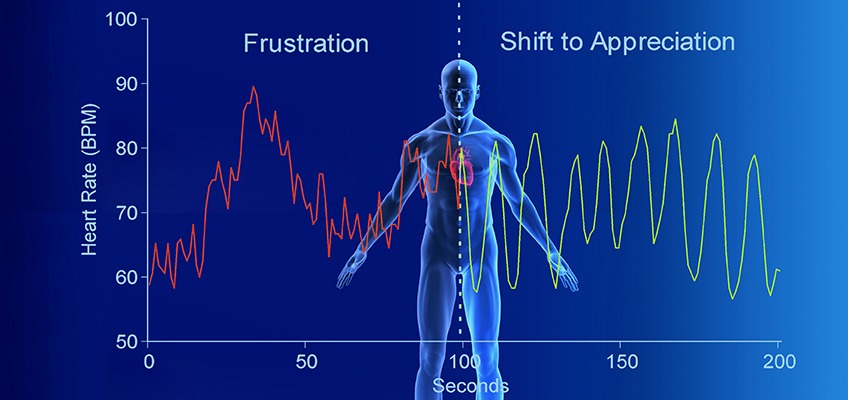Heart Rate Variability & Mental Health

Overview
Our heart is tuned in to our mental, emotional, and physical states. It beats FAST when we are excited or nervous, and it beats SLOW when we are calm, and relaxed.
Our heart’s rate is typically under the control of the autonomic nervous system (which regulates many organs and unconscious physical processes in our body). The autonomic system has two branches that have opposing effects on heart rate activity – The Sympathetic Nervous System kicks in during stress and ramps your heart rate up; and the Parasympathetic Nervous System slows your heart down when it’s time to relax.
Heart Rate Variability (HRV)
Heart Rate Variability is a GOOD THING. It is the healthy variation (in time) between each of your heart beats (beat-to-beat) and indicates the impact of psychological and physiological stress and fatigue on the body. Generally speaking, the more relaxed and free from stress you are, the more variability in the time between each of your heartbeats.
So, HRV is an important physiological marker for overall health, and the body-mind connection. It indicates how well the body can prevent and recover from stress and disease states.
HRV & Health
The relationship between HRV and health has been studied in unborn babies through to the aged. Just as having a high HRV is desirable and good, having a low HRV is a warning sign – it is predictive of increased risk of diabetes and mortality in middle-aged men, and this likely extends to the general population as well. Low HRV is also associated with increased blood pressure and can be used to project how well patients will recover from heart attacks.
HRV & Mental Health
Considering that the brain is a major part of the nervous system, it follows that reductions in HRV are associated with stress and mental health issues. We know that low levels of HRV are related to depression, anxiety, rumination, and self-criticism. On the other hand, increased HRV is associated with improved self-control, ability to deal with negative emotions and situations, and more social engagement.
Heart Rate Variability (HRV) Training
Given its relationship with all of these important processes, researchers have been studying how to harness HRV for physical and mental health applications. Generally referred to as HRV training, this often involves breathing exercises and relaxation or Mindfulness meditation techniques. Although not essential in boosting your HRV, often HRV exercises are paired with HRV biofeedback programs that provide instant visual or auditory information about your HRV as you work on moving it towards a target value.
There is a specific kind of breathing that is straight-forward way to increase your HRV and bring about the calming and soothing emotions we often feel when we feel ‘safe’. Feeling safe is linked to HRV and higher levels of HRV are in turn linked to a greater ability to self-soothe when stressed. This is important because by self-regulating, we can slow our body and minds, and re-center, so that we can take effective action without making a situation worse.
To learn about and practice a breathing activity that has been found to increase HRV and induce a lovely sense of calm, visit the Soothing Rhythm Breathing page.
HRV & Compassion
Increased HRV has been found to be specifically connected to the emotional state of compassion (vs simply experiencing positive emotions, which does not increase HRV).
This underscores the importance of HRV in facilitating compassion, which involves engaging with suffering (either within one’s self or others) while inhibiting the distress-related tendencies to either fight with or withdraw from the suffering. To read more about Compassion, click here
HRV Exercises
The following activities have been found to increase HRV:
- Soothing breathing, for which I have written a guide for, here
- Spending time in nature, which I have written about here
- Loving-kindness Mediation (LKM)
- Compassionate Letter Writing
- Compassionate Mind Training
- Using Self-Compassion Phrases & Compassionate Self-Talk
Further Resources:
- Learn to calm & soothe yourself with Soothing Rhythm Breathing
- Your Brain’s 3 Emotion Regulation Systems
- The Physiology of Self-Criticism vs Self-Compassion
- Dealing with your Inner Critic
- The Benefits of Compassion
- Learn about the Fears, Blocks, & Resistances to Compassion
- Common Obstacles in Learning Mindfulness
- How to deal with negative thinking


